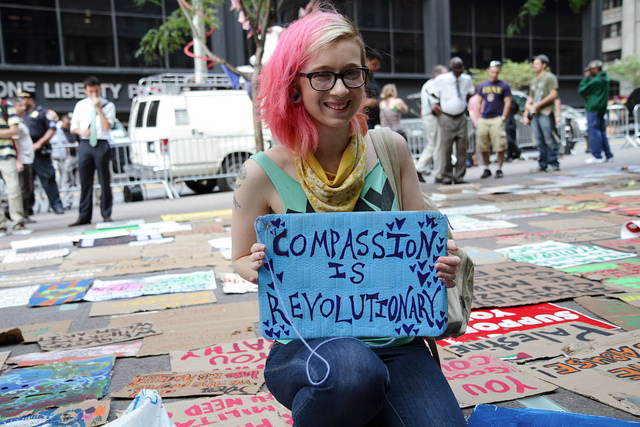One of the greatest teachers of our times, American poet and author Clarissa Pinkola-Estes, has given us a profound message of encouragement in a heartfelt letter to the world.
With all the passion that only a true leader can muster, Pinkola-Estes pleads with her words:
“Do not lose heart. We were made for these times.”
In her letter, Pinkola-Estes reminds us that we are a “civilized and visionary people,” correct in our assessment of the ”luster and hubris” we see around us, and not to forget who we are, what we are made of and why we were born now, at this moment.
“[Do] not spend your spirit dry by bewailing these difficult times. For years we have been learning and practicing, been in training for and just waiting to meet on this exact plane of engagement.”
Pinkola-Estes’ words struck me as true, especially when I took a moment to look around and see all those who have already risen to meet on this “exact plane of engagement.”
I thought of the mother who noticed that when Syrian refugees were carrying their children for days and days, it dawned on her that she could not carry her own son for more than 10 minutes. Without much forethought or concern, she formed an organization for others to donate carriers for the refuges to use.
I thought of the 400 Polynesian volunteers who spent four days building a 49 foot “Lei of Aloha” honoring the victims of the Orlando shooting—and then flew to Orlando to hold a blessing ceremony. The Lei is made of flowers, tea leaves and 49 shells from the island, each with a victim’s name written inside.
I thought of volunteers across Canada who have formed circles of welcome for the new refuges that are settling there. These volunteers “band together in small groups and personally resettle—essentially adopt—a refugee family.” In Toronto alone, hockey moms, dog-walking friends, book club members, poker buddies and lawyers have formed circles to take in Syrian families.
Pinkola-Estes compares us to ships upon the sea of life and says:
“There have never been more able vessels in the waters than there are right now…they are fully provisioned and able to signal one another as never before. Look out over the prow; there are millions of boats of righteous souls on the waters with you.”
She goes on to say that that while “the veneers of our ships may shiver” when the storms come, they are “made of the kind of long timbers that come from a greater forest than any and will withstand storms, hold together, and advance, regardless.”
She is right. Take a look around for yourself. Do you see that couple over there taking in a homeless woman until she gets back on her feet? Do you see those young men banding together to clean the yards of elderly citizens? Do you see the memes on your Facebook page filled with love and encouragement?
Pinkola-Estes gives us some helpful and clear direction in these times of rough waters:
>> Do not spend time thinking how much is wrong or unmended in the world.
>> Do not be weakened by dwelling on what is outside your reach.
>> Focus only on that part of the world that is within your reach.
>> Remember that you are needed and that “you will meet great souls along the way” who will greet you and love you and guide you.
>> Any small, calm thing to assist in this world will help—“it is not given to us to know which act or by whom the critical mass will tip toward an enduring good.”
The thing that I particularly like about Pinkola-Estes’ words is that I find them not only supportive and inspiring, but empowering as well. In her simple approach, I know that I can just keep putting one foot in front of the other and keep on doing what I am doing, and that in the end, my actions are part of the whole.
Dramatic change comes about not through one single act, but through an accumulation of acts that eventually tip the scale.
If we work toward that point of tipping the scale–alone or together in circles—the “enduring good” that we envision will come about.
Author: Carmelene Siani
Image: Paul Stein/Flickr
Editors: Catherine Monkman; Sara Kärpänen











Read 0 comments and reply